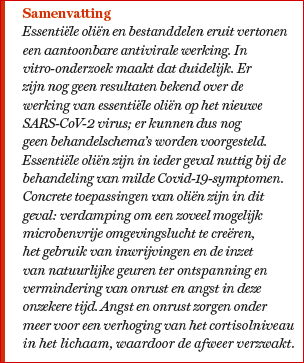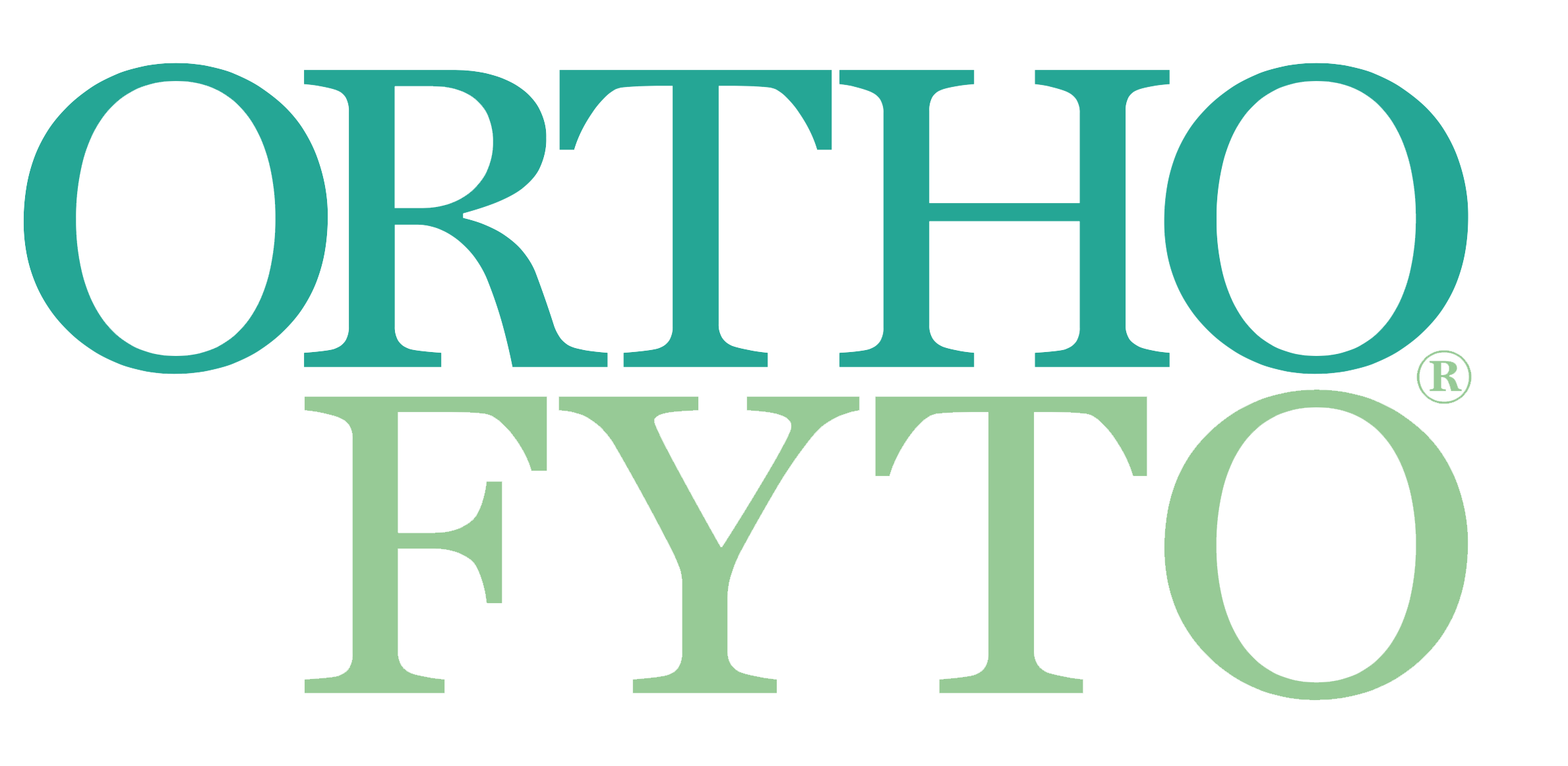SARS-CoV-2 en essentiële oliën
05 May, 2020
Door: Harmen Rijpkema
 We zijn met z’n allen koortsachtig op zoek naar manieren het coronavirus buiten de deur te houden, of de schade te beperken. Naast bestrijding zou echter de nadruk moeten liggen op een optimaal werkend immuunsysteem. Een sterk systeem kan terugvechten en levert dan een cruciale bijdrage aan herstel en beperken van infecties. In dit korte introductie-artikel bekijken we wat essentiële oliën in deze tijd kunnen betekenen.
We zijn met z’n allen koortsachtig op zoek naar manieren het coronavirus buiten de deur te houden, of de schade te beperken. Naast bestrijding zou echter de nadruk moeten liggen op een optimaal werkend immuunsysteem. Een sterk systeem kan terugvechten en levert dan een cruciale bijdrage aan herstel en beperken van infecties. In dit korte introductie-artikel bekijken we wat essentiële oliën in deze tijd kunnen betekenen.
In de eerste zestig jaren van de vorige eeuw werden virale aandoeningen nog niet goed begrepen en lag de nadruk vooral op bacteriële infecties. Er werd niets ontwikkeld tegen virale aandoeningen. Het begin van de aidscrisis was een duidelijk breekpunt. Iedereen besefte met een schok dat er geen industriële antivirale middelen waren ontwikkeld. Mensen die zich bezig hielden met onder meer fytotherapie en essentiële oliën kregen nu meer kans om op de voorgrond te treden. In 1987 publiceerden Lembke en Deiniger hun grensverleggende studie over o.a. de antivirale kwaliteiten van essentiële oliën en hun bestanddelen.1 Daarna volgden meer studies die hun bevindingen in vitro en (soms) in klinische studies bevestigden. Het meest bekend is het onderzoek naar herpes-beschadigingen en de genezende werking van bijvoorbeeld tea tree, sandelhout en citroenmelisse.2,3
Coronavirussen zijn zogenaamde omhulde virussen waarbij de uitwendige structuur bestaat uit een lipidemembraan dat gemaakt is met materiaal uit de gastheercel en het daarin opgeslagen RNA. Andere omhulde virussen zijn bijvoorbeeld het influenzavirus en het ebolavirus. Naast omhulde virussen zijn er ‘naakte’ virussen zoals het poliovirus of adenovirus. Virussen met een lipidemembraan zijn slim; ze zijn beter in staat het afweersysteem van de gastcel te omzeilen dan de naakte virussen waarbij het membraan ontbreekt. Essentiele oliën zijn vetminnend, hun basis is opgebouwd uit lipiden. Derhalve zouden essentiële oliën affiniteit kunnen hebben met de lipidemembraan van omhulde virussen.
Om het duidelijk te stellen: er is (nog) geen onderzoek beschikbaar naar de werking van essentiële oliën op dit nieuwe coronavirus. Daarom is er ook geen behandeling met essentiële oliën te adviseren voor deze infectie. Onderzoek naar de antivirale eigenschappen van essentiële oliën is tot nu toe beperkt tot laboratoriumonderzoek en er is weinig klinisch onderzoek beschikbaar naar bijvoorbeeld het herpesvirus. Resultaten van het meeste in vitro-onderzoek is niet direct te vertalen naar gebruik in de praktijk bij mensen die besmet zijn met het virus. Er bestaat echter wel veelbelovend onderzoek naar het influenza-A-virus en essentiële oliën.4 Dit is net als het coronavirus een omhuld virus. Maar we kunnen onderzoeksresultaten niet direct naar het coronavirus vertalen. We hebben nog geen idee over toepassingswijze, dosering en veiligheid.
www.stichtingaromatherapie.nl, www.chi.nl Lees het gehele artikel vanaf pagina 28 in OrthoFyto 3/20. Wilt u het gehele artikel als PDF bestand ontvangen? Bestel het dan hier voor € 3,50. Bronvermelding: Algemeen geraadpleegde naslagwerken: - Becker, S. (2020). Essential Oils and Coronaviruses. Tisserand institute. - Schnaubelt, K. – The Healing Intelligence of Essential Oils - The Science of Advanced Aromatherapy, Healing Arts Press 2011. ISBN 9781594774256 - Rijpkema, H. (2019). Aromecum, aromatherapie van absint tot zonnebloem (9de druk). Breda: Stichting Aromatherapie. ISBN 9789080912922- Lembke, A., Deiniger, R. Wirkung von Bestandteilen etherischer Öle auf Bakterien, Pilze und Virenin: Phytotherapie, ed. H.D. Reuter, H.D., Deiniger, R., Schulz, V. (Stuttgart: Hippokrates 1988)
- Schumacher, A. et al - Virucidal effect of peppermint oil on the enveloped viruses herpes simplex virus type 1 and type 2 in vitro– Phytomedicine 2003; 10(6-7): 504-510
- Schnitzler, P. - Essential oils for the treatment of Herpes simplex virus infections– Chemotherapy 2019; 64(1):1-7
- Garozzo, A. et al - In vitro antiviral activity of Melaleuca alternifolia essential oil- Letters in Applied Microbiology 2009; 49(6): 806 - 808
- Tariq, S. et al - A comprehensive review of the antibacterial, antifungal and antiviral potential of essential oils and their chemical constituents against drugresistant microbial pathogens– Microbial Pathogenesis 2019; 134: 103580
- Garozzo, A, et al - Activity of Melaleuca alternifolia (tea tree) oil on Influenza virus A/PR/8: study on the mechanism of action- Antiviral Research 2011: 89: 83-88. doi:10.1016/j.antiviral.2010.11.010
- Xinghua, L. et al - Melaleuca alternifolia concentrate inhibits in vitro entry of influenza virus into host cells - Molecules 2013; 18(8): 9550-9566
- Usachev, E. et al - Antiviral activity of tea tree and eucalyptus oil aerosol and vapor- Journal of Aerosol Science; 2013; 59: 22-30.
- Vimalanathan, S. - Anti-influenza virus activity of essential oils and vapors- American Journal of Essential Oils and Natural Products 2014; 2(1): 47-53
- Reichling, J. et al - Virucidal Activity of a β-Triketone-Rich Essential Oil of Leptospermum scoparium (Manuka Oil) Against HSV-1 and HSV-2 in Cell Culture- Planta Medica 2006; 71 (12): 1123-1127
- Schnitzler, P. et al - Melissa officinalis oil affects infectivity of enveloped herpesviruses- Phytomedicine 2008; 15(9): 734-740
- Astani, A. et al - Screening for antiviral activities of isolated compounds from essential oils– Evidence Based Complementary and Alternative Medicine 2011; doi: 10.1093/ecam/nep187
- Astani, A. et al - Comparative study on the antiviral activity of selected monoterpenes derived from essential oils – Journal of Phytotherapy Research 2010; 24(5): 673–679
- Loizzo, M. et al - Phytochemical analysis and in vitro antiviral activities of the essential oils of seven Lebanon species- Chemistry & Biodiversity 2008; 5(3), 461-470
- Jackwood, M.W. et al - Avian coronavirus infectious bronchitis virus susceptibility to botanical oleoresins and essential oils in vitro and in vivo– Virus Research 2010; 149(1): 86-94
- Ijaz, M. et al - The Seventeenth International Conference on Antiviral Research: Antiviral and Virucidal Activities of Oreganol P73-based Spice Extracts Against Human Coronavirus In Vitro- Antiviral Research 2004; 62(2): A1-A92
- Juergens, U.R. – Anti-inflammatory properties of the monoterpene 1,8-cineole: current evidence for co-medication in inflammatory airway diseases– Drug Research 2014; 64 (12): 638-646
- Brown, S.K. et al – 1,8-cineole: an underappreciated anti-inflammatory therapeutic– Journal of Biomolecular Research & Therapeutics 2017; 6(1)
- Lanzenstorfer, A. et al – The influence of air-dispersed essential oils from lemon (Citrus limon) and silver fir (Abies alba) on airborne bacteria and fungi in hospital rooms– Journal of Environmental Science and Health 2019; 54(3): 256 – 260.
- Goes, T. et al - Effect of sweet orange aroma on experimental anxiety in humans- Journal of Alternative and Complementary medicine 2012; 18(8): 798-804
- Chioca, L.R. et al – Anxiolytic-like effect of lavender essential oil inhalation in mice: participation of serotonergic but not GABAA/benzodiazepine neurotransmission– Journal of Ethnopharmacology 2013; 147(2): 412-418
- Malcolm, B.J., Tallian, K. – Essential oil of lavender in anxiety disorders: ready for prime time? - The Mental Health Clinician 2017; 7(4): 147-155
- Dayawansa, S. et al – Autonomic responses during inhalation of natural fragrance of cedrol in humans – Autonomic Neuroscience 2003; 108 (1-2): 79-86
- Charyasriwong S, Watanabe K, Rahmasari R, Matsunaga A, Haruyama T, Kobayashi N. In vitro evaluation of synergistic inhibitory effects of neuraminidase inhibitors and methylglyoxal against influenza virus infection. Arch Med Res. 2015 Jan;46(1):8-16. doi: 10.1016/j.arcmed.2014.12.002. Epub 2014 Dec 15.
- Pourghanbari G et al. Antiviral activity of the oseltamivir and Melissa officinalis L. essential oil against avian influenza A virus(H9N2). Virusdisease. 2016 Jun;27(2):170-8 2016 May 21.
- Shannon Becker, S. Essential Oils to Prevent the Spread of Flu. Geraadpleegd op 22 april 2020.
